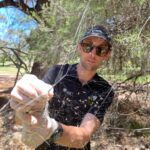A Curtin study in collaboration with and funded by Princess Margaret Hospital, has found musculoskeletal pain disorders can significantly affect the lifestyle and physical and psychological behaviour of older children and adolescents, refuting results from previous studies.
Professor Peter O’Sullivan from the School of Physiotherapy and the Curtin Health Innovation Research Institute (CHIRI) said often a specific cause of the symptoms for chronic musculoskeletal pain (CMSP) could not be found, resulting in a lack of clear diagnosis of these pain disorders.
The study documents the characteristics of 30 subjects aged seven to 18, with chronic non-specific musculoskeletal pain (CNSMSP) who have high levels of pain and disability, significant school absenteeism and moderate levels of fear of movement and activity.
“There was a group of individuals who reported back pain and displayed clear differences in psychosocial behaviour, lifestyle and physical profiles compared to matched pain free controls,” Professor O’Sullivan said.
Results showed that psychologically, children had increased levels of anxiety and depressed mood, and had more body pain complaints. In terms of their lifestyle, children had lower physical activity levels and poorer gross motor skills. Physically, they tended to sit with a more slumped spinal posture, had reduced back muscle endurance, and increased presence of joint hypermobility.
Professor O’Sullivan said the study clearly demonstrated these pain disorders were multifactorial in nature.
“As such, patients should be assessed and managed from a number of perspectives – that considers the biological, lifestyle, psychological, and social aspects – and not just a biomedical perspective,” he said.
“Further research is required, with larger numbers of children and adolescents, to expand the profile of these subjects and to increase our understanding of how multiple domain factors may interact and to investigate the evolution and management of these disorders.”
There is also evidence these disorders in adolescents increases the likelihood of future adult chronic musculoskeletal pain, and thus early multi-disciplinary intervention is critical in order to avoid this.
Contact:
Teresa Belcher/Kristy Jones, Public Relations, Curtin University
Tel: 08 9266 9085; Mobile: 402 517 300 Email: teresa.belcher@curtin.edu.au / k.jones@curtin.edu.au
Professor Peter O’Sullivan, School of Physiotherapy, Curtin University
Tel: 08 9266 3629; Email: P.Osullivan@curtin.edu.au
Web: http://curtin.edu.au


